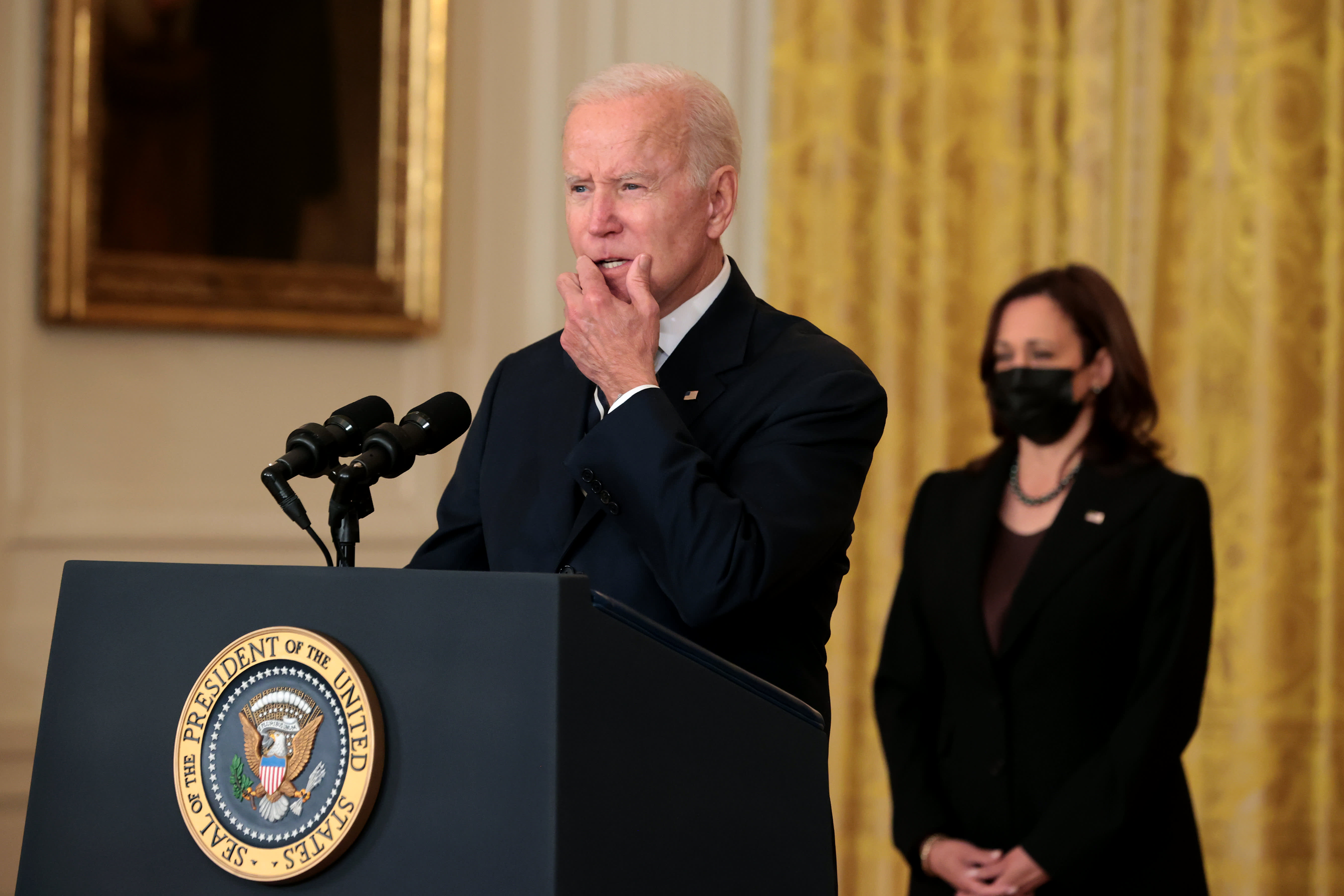
U.S. Vice President Kamala Harris (R) listens to President Joe Biden deliver remarks about his proposed ‘Build Back Better’ social spending bill in the East Room of the White House on October 28, 2021 in Washington, DC.
Chip Somodevilla | Getty Images
President Joe Biden’s social spending and climate policy bill has stalled in the Senate, all but extinguishing Democrats’ hopes of passing it this year.
Sen. Joe Manchin, a conservative Democrat who alone can block his party’s plan, has not signed off on the $1.75 trillion proposal as his party waits to see whether it complies with Senate rules. It means any vote on the bill will likely slip into 2022, when the coming midterm elections will only heighten the sharp political pressure surrounding the plan.
Senate Majority Leader Chuck Schumer on Wednesday said his party will “continue working on getting the Senate into a position where we can vote on the president’s Build Back Better legislation.” He did not mention his goal of approving the plan by Christmas — a target date he has repeated for weeks.
Asked Wednesday if he believes the bill can pass this year, Biden said, “I hope so. It’s going to be close.”
Failure to pass the plan in 2021 will have immediate impacts. The enhanced child tax credit of up to $300 a month per child will expire at the end of the year unless Congress extends it. The last payments to families went out Wednesday, and the Build Back Better Act would renew them for a year.
Manchin on Wednesday denied a report that his opposition to extending the bigger child tax credit is holding up the bill. He said he has “always been for child tax credits,” before growing irritated with reporters asking him about the legislation, according to NBC News.
“I’m not negotiating with any of you all, okay?” he said. “So you can ask all the questions you want — guys, let me go. This is bulls—. You’re bulls—. Okay. I’m done, I’m done!”
Democrats are considering options to continue the child tax credit through a separate bill. It is unclear how they would pass the extension, as they likely will not garner the 10 Republican votes needed to break a filibuster.
As the bill hits a wall, the Senate will turn its attention to other priorities. Senate Democrats have discussed possible tools to bypass the filibuster and pass a voting-rights bill in the coming weeks with no Republican support.
The idea of using a temporary filibuster carveout has gained traction after Manchin and Sen. Kyrsten Sinema, D-Ariz., voted to use a similar tactic to pass a debt ceiling increase this week. Democrats have tried to pass federal voting rights legislation this year after several states passed restrictive voting laws, but Republicans have blocked their efforts, insisting states should control elections.
U.S. Senator Joe Manchin (D-WV) pauses during remarks to reporters at the U.S. Capitol in Washington, D.C., U.S. November 1, 2021.
Jonathan Ernst | Reuters
Delays in passing the Build Back Better Act would have broader implications beyond the Senate’s plans. Democrats see the legislation as a transformative package that would make child and health care more affordable, offer an extra layer of financial support to families and make the biggest investment in curbing climate change in the country’s history. The longer it remains in limbo, Democrats must continue to deal with the appearance that they are not coming through for their voters.
Republicans call it an overwrought spending plan that would fuel inflation. Failure of the bill would provide grist for tarring Democrats as ineffective even as they continue to criticize their platform.
The legislation’s fate could affect the midterms. Democrats have looked for progress they can sell to voters as Republicans appear favored to regain control of the House — and potentially the Senate.
Biden’s approval ratings have sagged despite the economic aid Democrats delivered this year and the passage of a bipartisan infrastructure law. Voters may not see the benefits of the infrastructure package for months or years.
Manchin has not ruled out voting for the pending social spending and climate bill. But even after he pushed his party to slash the plan’s price tag to $1.75 trillion from $3.5 trillion, he expressed concerns about its cost and potential to increase inflation.
Manchin spoke to Biden this week, but the conversations yielded no apparent breakthrough on the Build Back Better plan. Asked Wednesday about Schumer’s Christmas target to pass the bill, Manchin noted that the Senate parliamentarian has not ruled on what Democrats can include in the final package.
“We don’t have anything to vote on!” he said.




